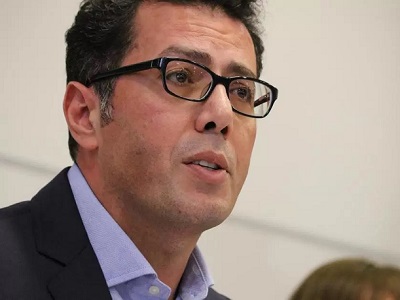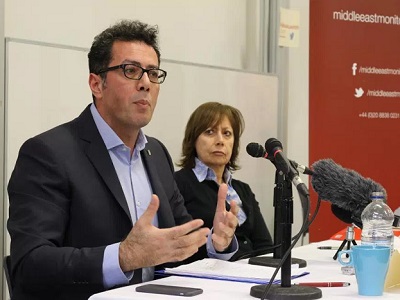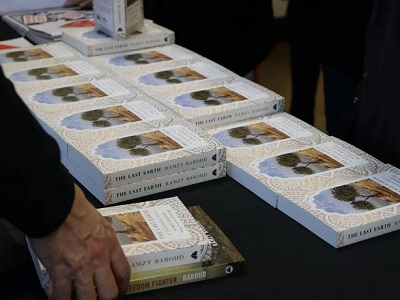MEMO Hosts Launch of The Last Earth by Ramzy Baroud

Ramzy Baroud speaking before a packed lecture theater at Imperial College, London. (Photos: Jehan Alfarra, MEMO)
On Tuesday, March 27, Middle East Monitor (MEMO) hosted Ramzy Baroud as he launched his new book The Last Earth in front of a packed lecture theater at Imperial College, London.
Chaired by Dr Dina Matar of the Centre for Palestine Studies at SOAS, University of London, Baroud shared his thoughts on some of the biggest issues facing Palestinians today and read a number of moving extracts from the book itself.
Baroud opened with a thought on how the book came about and the logic behind choosing to relay the stories of ordinary Palestinians. He noted that while there are many reasons he could cite, perhaps the most poignant was the fact that he was born in Nuseirat refugee camp in central Gaza.

Baroud related the story of how, during the First Intifada of 1987, aged just 13 or 14, he witnessed what local residents called the “Eid Massacre” in which several young men were killed and many more wounded.
As Baroud sat in his family home, his father played with the radio, hopelessly searching for any station, from any corner of the world, that might be talking about the killings. No one was. Baroud explained that from that moment on, he realized there was a need to convey the story of his neighborhood, which for him represented a collective within a collective suffering the same fate on a colossal scale.
For him, telling the stories of ordinary Palestinians is part of the larger struggle to make Palestinian voices heard, to take ownership of the discourse and create a space in which the stories of the everyman do not need to be validated by another, more dominant voice.

This theme ran throughout the launch, with each of the individual stories presented in the book depicting a different angle or aspect of what it means to be Palestinian.
Baroud read a number of excerpts from the book, including the story of Ali Abumghasib, a Bedouin refugee whose family was forced to flee Palestine during the Nakba of 1948. Baroud explained that he did not originally intend to include Ali’s story in the book, but when he helped to pen some letters to Ali’s family, who had gone missing during the chaos of the Syrian Civil War, what resulted was a poignant story of loss, resilience and hope as told in the chapter “Letters to Heba.”
Wrapping up the talk and opening the floor to questions, Dr. Dina Matar commented on the intricate way in which each of the stories was woven together in order to present a coherent, collective narrative. She noted how one of the book’s greatest strengths was its relatability to Palestinians and non-Palestinians alike, a fact which showed in the insightful questions posed by the diverse audience present at the launch.
These ranged from discussions of how the Palestinian question fitted into other ongoing crises like Kashmir and the question of the Rohingya, to the role of second generation refugees in narrating their own story and that of their parents.
Baroud wrapped up the talk by urging people not to wait for an invitation to speak on the question of Palestine, but rather to find every possible way to show solidarity with the Palestinian people.
– Rebecca Stead is an MA student at SOAS University of London studying Middle Eastern Studies with Arabic, Stead focuses on the history, culture and politics of Israel-Palestine specifically and the Levant more broadly. She has traveled in the region and studied Arabic in Jerusalem and Amman, and works in a freelance capacity for a number of journals and blogging platforms.










































0 Comments